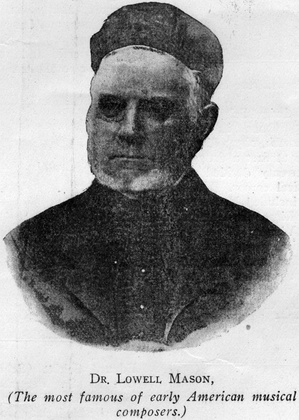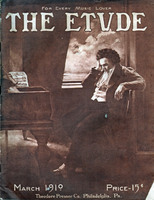[Editor’s Note.—The following excellent biographical article concerning Lowell Mason, father of William Mason, the famous American pianist, teacher and author of “Touch and Technic,” appeared in a leading English publication called “Musical Opinion.” Dr. Lowell Mason’s greatest American predecessor was William Billings, an uncouth and almost illiterate maker of church tunes, who is said to have been the first to give concerts in New England and to whom is also attributed the first use of the ‘cello and the pitch pipe in connection with early church choir work in “America.” Dr. Lowell Mason represented a great step in advance and although he is best known for his collections of hymn tunes, which were enormously popular in their day and which brought him large financial returns, his greatest work was to prepare the musical taste of the country for the next evolution in musical culture, which led to the wonderfully high standard found in many musical communities in America at this day.]
 The name of Lowell Mason is familiar, chiefly as that of a composer who gave us such favorite tunes as “Heber” (“From Greenland’s Icy Mountains”) and as “Olivet” (which was written for Dr. Ray Palmer’s “My faith looks up to Thee” a day or two after the words of that much prized hymn had come into existence). It was Mason who adapted the tune “Felix” from Mendelssohn’s “Festgesang” and it was Mason who carved “Evan” out of the Rev. W. H. Havergal’s setting of Burn’s prayer, “O Thou dread Power.” But what do we really know nowadays about Mason himself and about his professional life work? Very little, I fear; and it is chiefly with the view of remedying this defect that I am writing the present sketch.
The name of Lowell Mason is familiar, chiefly as that of a composer who gave us such favorite tunes as “Heber” (“From Greenland’s Icy Mountains”) and as “Olivet” (which was written for Dr. Ray Palmer’s “My faith looks up to Thee” a day or two after the words of that much prized hymn had come into existence). It was Mason who adapted the tune “Felix” from Mendelssohn’s “Festgesang” and it was Mason who carved “Evan” out of the Rev. W. H. Havergal’s setting of Burn’s prayer, “O Thou dread Power.” But what do we really know nowadays about Mason himself and about his professional life work? Very little, I fear; and it is chiefly with the view of remedying this defect that I am writing the present sketch.
Lowell Mason’s career has been most intimately outlined by his distinguished son, the late William Mason, who died in August, 1908. Born at Medfield, Massachusetts, in January, 1792, this prince of early American psalmody reformers showed such a fondness and an aptitude for music that he was appointed leader of a church choir in his native town when only sixteen years old. In 1812, before he was twenty, he heard of an opening in a bank at Savannah, Georgia; and, having secured the position, he went there.
Out of business hours he did nothing but study music. Of course, he attempted composition, his first efforts being hymn tunes and anthems. He had got hold of the “Sacred Melodies” of our William Gardiner, that musical stocking manufacturer of Leicester who sent to Haydn a present of half a dozen pairs of cotton stockings, into which were woven the notes of “God preserve the Emperor,” “My mother bids me bind my hair” and other thematic material, including the Andante from the “Surprise” Symphony. Mason conceived the idea of an American edition of this work and he prepared it accordingly, adding at the same time some of his own compositions. In vain he tried the music publishers of Boston and Philadelphia; they would have nothing to do with Mason and his melodies.
Presently a Boston organ builder, Mr. W. W. Goodrich, came to Savannah to set up one of his instruments. He made Lowell Mason’s acquaintance and induced him to proceed to Boston in person. There the collection just mentioned was submitted to Dr. G. J. Jackson, the organist of the Handel and Haydn Society, whose warm approval it received. Jackson determined to see it published; and published it was, in 1822, with the title of “The Boston Handel and Haydn Society’s Collection of Music.” The book proved an instant success, finding its way into singing schools and church choirs throughout the whole of New England.
HIS WORK IN NEW ENGLAND.
It was the success of this first venture that led Lowell Mason to leave Savannah and to settle in Boston. At that time the Handel and Haydn Society was largely recruited from church choirs and its concerts were devoted almost entirely to church music. For five years Mason was president of the society and served as musical director, the engagement of an official conductor not having been authorized until 1847. Meanwhile, Mason was constantly aiming at the introduction of popular education in music. It was through his efforts—and strenuous efforts they were—that music was introduced into the Boston schools. To bring this about, Mason first taught classes of children free of charge and gave concerts to illustrate the practicability of his plans. When, finally, musical education was made a part of the Boston public school system, the city council refused to make any financial provision for it, and Mason served as instructor for a year gratuitously. The experiment proved a complete success. Music was gradually introduced into all the public schools and Mason was made superintendent of the department. The seeds he sowed are still bearing fruit.
His energies burst out into other directions: thus he originated the idea of assembling music teachers in classes. In 1838, when the experiment was only three years old, a hundred and thirty-four teachers —representing ten States—gathered at the Boston Academy of Music, which he had founded in 1832. From these assemblages grew the musical conventions which Mason held throughout New England and in some of the other States. Choir singers and other musically inclined people from the towns lying within the surrounding districts would meet at a central point and he would hold a musical convention lasting for several days. He drilled the singers in church music and also, where he found sufficient advancement, in music of a higher order.
Lowell Mason was an ardent advocate of congregational singing, about which we hear so many and such divergent views in these days; and the stimulus which he gave to the movement in its favor bore very rich fruit. He put forth many volumes in the interest of better sacred music, not only for the congregation but for the choir, the Sunday-school and for church societies. In this work, in deed, he continued until within a few years of his death in 1872.
IN LONDON.
Mason paid a visit to London about the time when the late John Hullah’s classes were causing much excitement; and he gave some lectures in the Weigh-house Chapel. “The charm of his manner and the wonderful facility for teaching which he possessed,” says Mr. Spencer Curwen in his “Studies of Worship Music” (1880), “are remembered by all who were privileged to hear and have intercourse with him.” Dr. Mason’s notions of congregational Psalmody were in harmony with those of the Weigh-house leaders and he rendered valuable help in their new tune book, which was issued in 1853 as “Congregational Church Music.”
Mason’s hymn tunes had a long run of popularity and several of them are likely to remain popular. “Some of my father’s hymn tunes have become famous,” wrote William Mason in 1900. “It has been said that his missionary hymn, ‘From Greenland’s icy mountains,’ has been sung in more languages than any other sacred tune. Among the many popular tunes which he composed are ‘Boylston,’ ‘Hebron,’ ‘Olivet’ and ‘Bethany;’ and I know that one of his collections of sacred melodies brought him over a hundred thousand dollars in royalties.”
FAMOUS HYMNS.
The story of the composition of “Heber” (as the tune for the missionary hymn is now generally called) is rather interesting. It belongs to the period when Mason was clerking in the Savannah bank. It seems that a lady residing in Savannah became possessed of a copy of Heber’s verses, sent to America from England. This was in 1823. She was arrested by the beauty of the poetry and by its possibilities as a hymn. But the metre was almost new at that time; there was no tune that would fit the measure. Well, the Savannah lady had been told of a young clerk in a bank, Lowell Mason by name, just a few doors down the street. It was said that he had the gift for making tunes. So the lady sent her son to the genius in music, and in half an hour’s time he returned with the tune as we know it. Such is the story as Lowell Mason’s family used to tell it.
As regards “Olivet,” it was, as I have already indicated, called into being directly for Dr. Ray Palmer’s “My faith looks up to Thee.” Palmer, a congregational minister, had written the hymn in 1830, when he was twenty-one. He wrote it for himself, “to voice the deep feelings of his own soul, in special distress at the time through ill health.” It was brought forth from its hiding a year later on the special request of Lowell Mason for a contribution to the new “Spiritual Songs for Social Worship” which he and his friend, Dr. Thomas Hastings, were preparing. There being no tune for it, Mason set himself to write one, “Olivet” being the result.
There are other tunes of Mason about each of which some little story might be told, if one’s space were not already filled. The American churches can naturally appreciate better than we can the work which he did as a composer. The style which he inaugurated was practically quite new to America: it indicates the transition from the fugue tune to the modern form and connects all previous periods in one production. But it was not a uniform style, as any one may see by a close study of the tunes which have his name attached. Evidently he had not formulated any positive principle. He alternates between one form and another and there is no steady process. His influence, therefore, depends upon the general direction in which he is moving rather than upon any goal which he has reached. Nevertheless, his influence was most profound. Direction is much, though not everything; being once established, the goal is sure to be reached. Lowell Mason broke away from current forms, supplied the corrective of many abuses and started upon a path in which others, following his leadership, soon achieved the best results.



